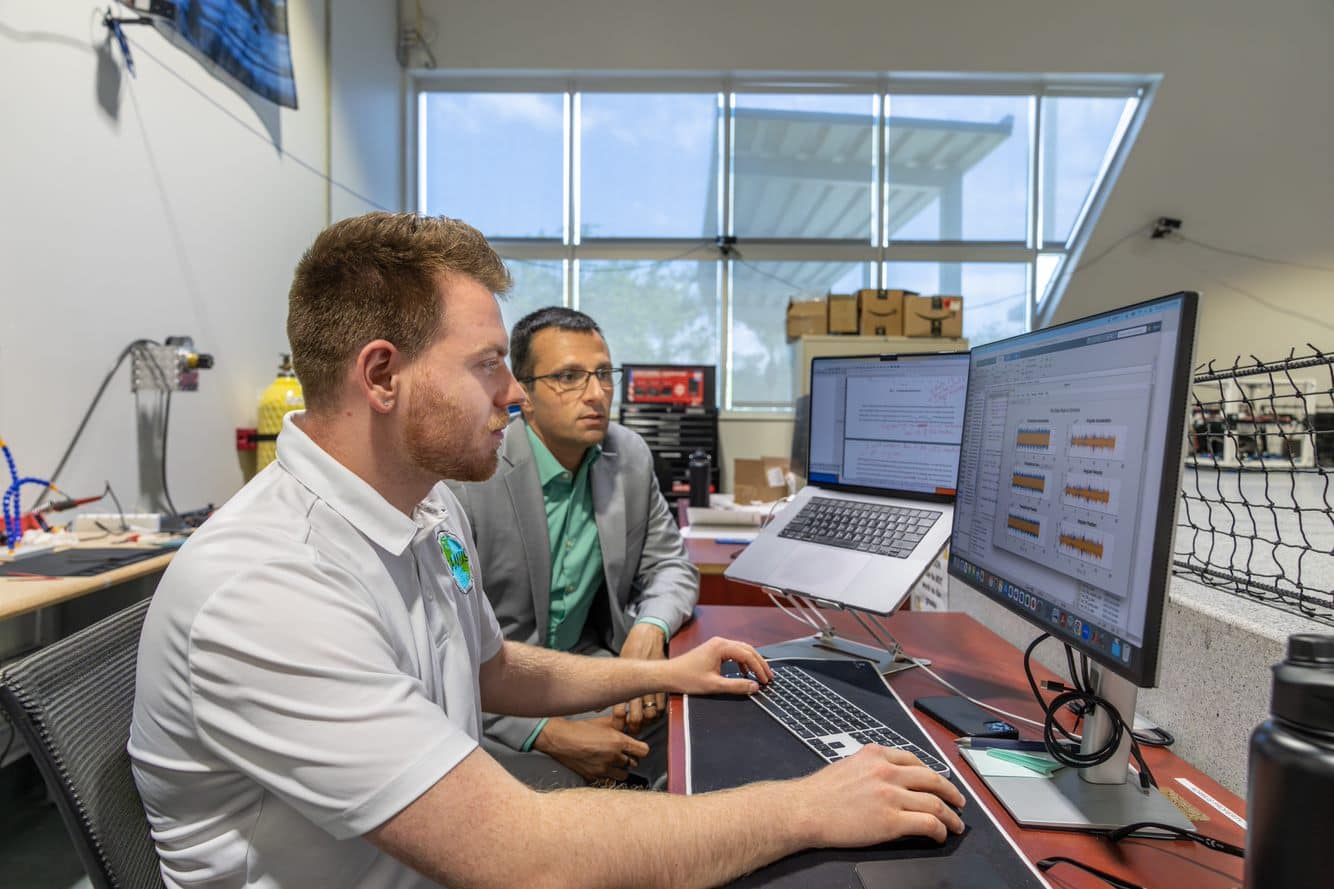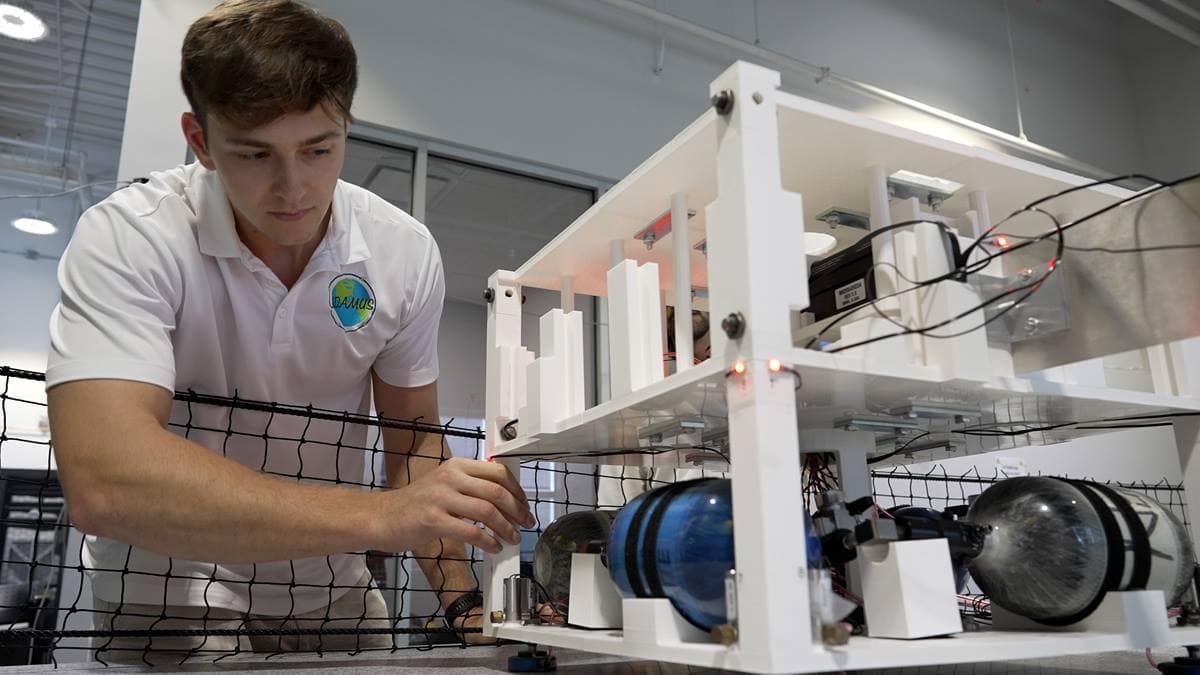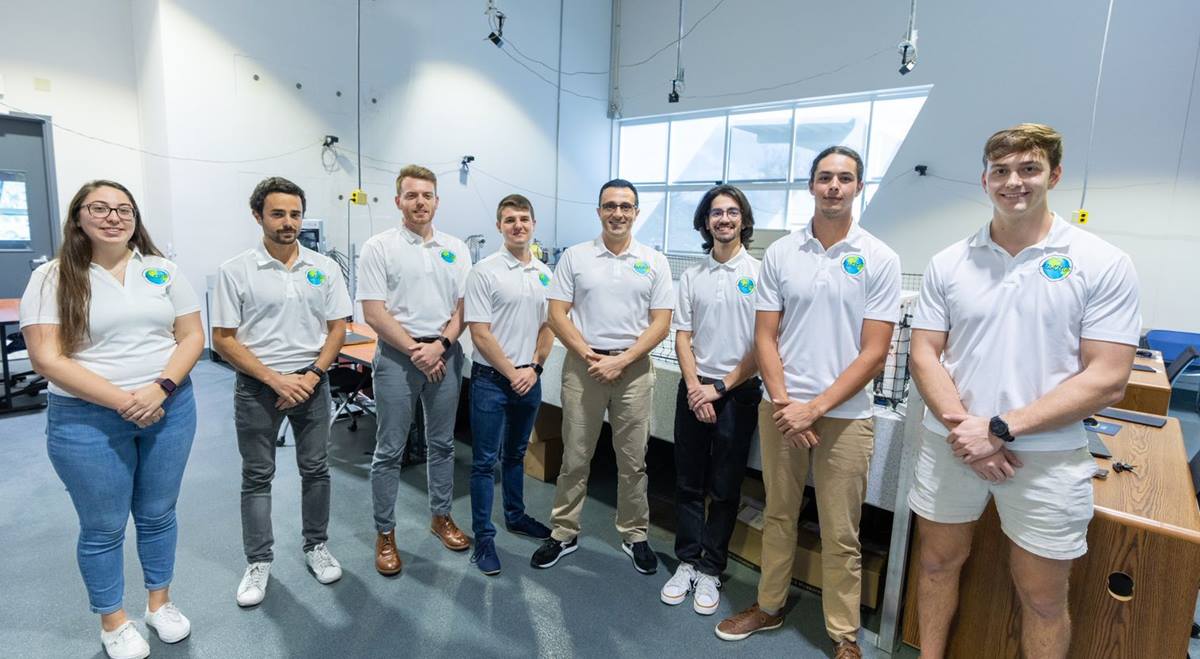Embry-Riddle Star Researcher’s Leadership Inspires Student Success

Dr. Riccardo Bevilacqua, professor of Aerospace Engineering at Embry-Riddle Aeronautical University, has published an article in the AIAA Journal that opens a new path to predicting the behavior of fragmentation from explosive warheads, reducing the risk of collateral damage.

As an undergraduate, Spencer John had a paper published in Acta Astronautica, coauthored by Dr. Riccardo Bevilacqua. (Photo: Embry-Riddle/Bernard Wilchusky)
The recent publication, which also lists one of Bevilacqua’s Ph.D. students as an author, is an example of the success that the professor, who was recently named Researcher of the Year by Embry-Riddle’s College of Engineering, has had in publishing — and in providing his students a platform on which to participate in major projects.
“Dr. Bevilacqua has been an extremely important influence on my academic career,” said Katharine Larsen, the student who is one of the paper’s four authors. “Without him as my advisor, I would only have completed my master's degree, probably in the non-thesis track at that, but he has encouraged me to meet my full potential. I am now a Ph.D. candidate, as well as a DoD SMART Scholar and an Intuitive Machines and Columbia Sportswear Advancing Women in Technology Program fellow.
“I'm not saying I wouldn't be successful without Dr. Bevilacqua, but I definitely wouldn't be where I am right now.”
Since joining Embry-Riddle in 2021, Bevilacqua has secured research funding of more than $1 million, hiring five Ph.D. students and two undergraduate researchers to participate in his projects, and he is the principal investigator or co-investigator on several pending research proposals. A nominating statement for the Researcher of the Year award said, “all his resident students and visiting researchers end up publishing in top journals,” adding that he has “created an atmosphere of collegiality and friendship” within his research group.

Members of the ADAMUS lab pose with Dr. Riccardo Bevilacqua (center). (Photo: Embry-Riddle/Bernard Wilchusky)
"Riccardo’s research program highly engages doctoral students, offering immense value through research exposure and direct contribution to the discovery of process knowledge," said Jeremy Ernst, vice president for research and doctoral programs. "Dr. Bevilacqua’s work not only has disciplinary impact but provides meaningful experiences that shape the research agendas of future scholars."
Doctoral student Ryan Kinzie said, “I think the biggest thing Dr. Bevilacqua has done for all of his students is see the potential in us that we sometimes don’t see ourselves. He pushes us to reach that potential and does the most for each one of us to make sure we each have everything we need to succeed.”
Kinzie in May won a NASA Space Technology Graduate Research Opportunities fellowship, which comes with an $84,000 renewable grant, plus a yearly stipend. “Dr. Bevilacqua is the one who tasked me with working on gravity recovery missions, which ultimately led to me receiving the graduate fellowship with NASA. He is the one who pushed me to apply for the fellowship in the first place.”
Ph.D. student Nicolo Woodward, who first studied with Bevilacqua at the University of Florida and then followed him to Embry-Riddle, was selected last year to receive funding from a GAANN (Graduate Assistance in Areas of National Need) grant, awarded by the U.S. Department of Education.
Woodward said Bevilacqua’s mentorship has had “a huge impact on my educational career and made me the engineer and researcher I am today. Thanks to him I was exposed at an early age to complex projects where I have gained invaluable experience in the design, testing and assembling processes of building small spacecraft.”
Recent graduate Pol Fontdegloria, who will begin an Aerospace Engineering master's at Embry Riddle in the fall, said Bevilacqua provided him the opportunity to work with aerospace hardware in open-ended projects, “taking me out of my comfort zone and providing me with valuable experience that will help me in my future career. Furthermore, Dr. Bevilacqua's work and passion for engineering motivated me to keep pursuing my education after graduation and keep doing research with him.”
Along with Fontdegloria, recent graduate Spencer John had a paper published with Bevilacqua on the topic of space debris removal in the journal Acta Astronautica, in February. Being published as undergraduates was a significant, and relatively rare, accomplishment.
John said that working with Bevilacqua allowed him to apply classroom knowledge to actual hands-on work.
“From spacecraft simulators to the Helmholtz cage, or even being able to 3D print my designs, Dr. Bevilacqua’s lab introduced me to different ideas and equipment that I likely would have never experienced otherwise,” John said, adding that Bevilacqua’s mentorship went beyond the immediate research.
“Working with Dr. B helped me grow as both an engineer and a person. When I was approaching graduation and beginning my job search, he was my biggest ally,” he said. “I am forever grateful for not only the chance to work academically with him, but also the opportunity to meet and build a connection with such a polished, professional role model.”

 Michaela Jarvis
Michaela Jarvis